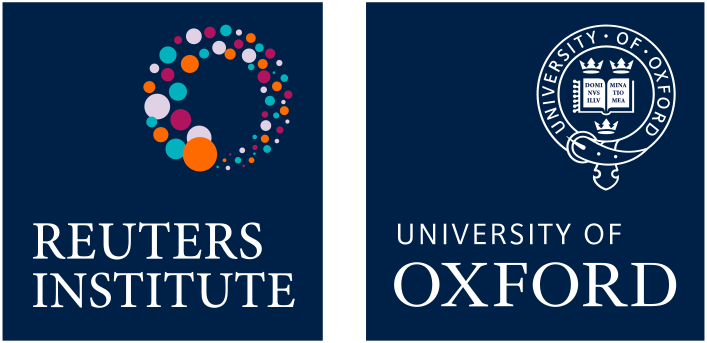
Thailand
Thailand’s media market is fragmenting as traditional outlets lose ground to influencers, algorithm-driven content, and a broader digital shift. Infotainment often overshadows public-interest reporting, deepening divides and weakening press freedom in a landscape shaped by platform economies and fragile regulation.
According to our Digital News Report survey 2025, more than eight in ten (88%) Thais now access news online each week. Smartphones have become the dominant gateway, with digital engagement highest in urban areas. Among younger audiences aged 18 to 34, almost two-thirds (63%) rely on social media as their primary source of news. Against this background news publishers are struggling to attract attention with their traditional mix of online formats. Thailand is one of the few countries in our survey where people say they’d rather watch the news online (43%) than read it (32%), with video primarily accessed via Facebook, YouTube, and TikTok, with live streams and interactive explainers gaining traction among younger consumers. Use of TikTok for news (49%) is growing fast (+10pp) across all demographics. Despite limited competition among internet service providers, low data costs remain an important driver of multimedia news consumption.
AI-generated news is also expanding in Thailand, with Nation TV introducing virtual anchors. The first AI presenter, Natcha, debuted in April 2024 during the News Alert programme, followed shortly by Marisa of Mono 29 in May 2024.1 The public broadcaster, Thai PBS, is moving forward with plans to use AI to enhance its news service, highlighting the need to balance cost, credibility, and appearance when choosing between human presenters and AI avatars, with legal considerations. The willingness of publishers to experiment may partially explain why Thai audiences seem to be more comfortable with different uses of AI in news than most other countries in our survey – specifically around features such as summarisation and automated translation. These initiatives offer potential cost savings for an economically challenged industry but have sparked broader debates about job displacement, accuracy, and ethics.
Trust in the news media remains a complex issue. Traditional television channels still largely command public confidence. Channel 7 HD (74%), Amarin (73%), and Workpoint TV (72%) have relatively high trust scores, along with Thai PBS (72%) and Thai Rath (70%). However, signs of decline are evident. Nation TV – once a flagship outlet – has dropped to 62% trust, while regional and local news outlets, which are amongst the most challenged from a business perspective, are trusted by just 59%. Thailand’s news industry is facing a deepening crisis, with falling ad revenues, shifting audiences to streaming, and downsizing digital TV networks. Reliance on so-called ‘branded content’ has blurred the line between journalism and marketing, weakening editorial independence. As digital TV licences near expiry in 2029, some broadcasters may exit, further fuelling competition online. At the same time, online news influencers are starting to rival traditional media, reshaping journalistic roles.
Personalities like Kanchai Kamnerdploy, a former actor, is recognised by six in ten (60%) of our Thai respondents,2 reflecting a public shift towards infotainment. His daily TV talk show, Hone Krasae, which takes on controversial issues, is often extended via Facebook and YouTube channels, where there are fewer restrictions on what can be said. Analytical journalists like Suthichai Yoon (25%) and Jomquan Laopetch (20%) retain recognition among educated audiences in Bangkok. Content creators such as Anuwat Noom (37%), Pond on News (6%), and Tud Yoi Khao (5%) have bypassed traditional editorial structures, offering concise content, emotionally engaging yet often lacking in traditional journalistic rigour –meanwhile, figures like Sondhi Limthongkul (32%) blur journalism and activism. While the National Broadcasting and Telecommunications Commission (NBTC) is pressing for greater regulation online, platform control remains mainly with foreign companies, limiting effective oversight.
The return of the Shinawatra family to power has failed to deliver the economic success many had hoped for, while the dissolution of the youth-driven Move Forward Party has dealt a severe blow to prospects for political reform. Political constraints still impact press freedom in Thailand. Lèse-majesté laws continue to impose harsh penalties for perceived royal disrespect, deterring investigative reporting and reinforcing state narratives. Social media, once a platform for free expression, faces increasing surveillance, with cyber laws used to silence dissent.3 Notably, monarchy-focused news coverage has been diminished, with some royal correspondents cut due to financial pressures.
Thailand’s news media is at a crossroads as it looks to uphold journalistic integrity while navigating digital disruption and political constraints in a platform-dominated environment that seems to favour personality-led commentary. Without intervention, truth may become in short supply and journalistic scrutiny increasingly rare.
Professor Jantima Kheokao
Asian Network for Public Opinion Research
Dhanaraj Kheokao
Potsdam University, Germany
Changing media
Although television remains an important source of news for older Thais, our more educated, urban sample relies heavily on online and social media sources for news. The most important social media platforms for news include Facebook, YouTube, Line, and TikTok.
Trust in news overall
55%
(+1)
=5/48
Trust in Thai media remains stable at 55%, which is relatively high by international and regional standards. Despite this, younger audiences (47%) are considerably more sceptical than older ones (58%). Trust in specific brands also remains surprisingly strong (more than 60% in most cases), but this is largely shaped by legacy sentiment in what is still a strongly deferential society, rather than by the quality of journalistic output.
RSF World Press Freedom Index
85/180
Score 56.72
Measure of press freedom from NGO Reporters Without Borders based on expert assessment. More at rsf.org
Share news via social, messaging or email
37%
Footnotes
2 Survey respondents were asked if they had seen a list of named individuals discussing or commenting on the news in the last week.

